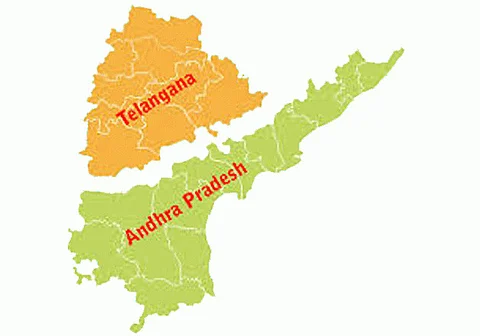

A fierce water dispute over the Banakacherla irrigation project is escalating between Telangana and Andhra Pradesh. Andhra Pradesh is working to complete the project, which aims to divert Godavari water to Rayalaseema as quickly as possible, with the assistance of the central government.
Meanwhile, the Bharat Rashtra Samithi (BRS) in Telangana is accusing the ruling Congress party of failing to effectively obstruct the project, suggesting a political angle to the ongoing inter-state water conflict. The Godavari-Banakacherla project, advocated by Andhra Pradesh Chief Minister Chandrababu Naidu, has not yet secured approvals from the Godavari River Management Board (GRMB), the Central Water Commission (CWC), or the Apex Council, according to a PowerPoint presentation (PPT) by BRS MLA and former irrigation minister Harish Rao.
Telangana has consistently opposed this initiative, contending that it breaches the Andhra Pradesh Reorganisation Act of 2014 and the Godavari Water Disputes Tribunal (GWDT)of 1980. During the GRMB meeting on April 7, 2025, officials from Andhra Pradesh acknowledged that the project remains in its conceptual phase, a feasibility report is still pending, and no clearances have been obtained. Telangana's Irrigation Minister Uttam Kumar Reddy and other officials have formally raised objections with the GRMB, CWC, and the Union Ministry of Jal Shakti, claiming that the project lacks the necessary clearances and threatens the water rights of Telangana.
BRS MLA T. Harish Rao has presented concerns regarding the possible depletion of Telangana’s water share due to the proposed diversion of over 200 TMC of Godavari water to Rayalaseema through the Bollapalli reservoir and Banakacherla regulator. He cautions that Andhra Pradesh’s push to expedite the project could bolster its position in any forthcoming tribunal regarding the Godavari, potentially diminishing Telangana’s riparian share.
Telangana fears that this diversion, which links the Godavari, Krishna, and Penna rivers, could jeopardize its water security, especially since the GWDT has not clarified how much surplus water is available in the Godavari. There are also assertions, particularly from Harish Rao, suggesting that the central government, led by the BJP, is facilitating the project through implicit approval and possible funding; however, there is no concrete evidence to substantiate these claims.
Andhra Pradesh is reportedly fast-tracking its efforts, aiming to complete the Detailed Project Report (DPR) by the end of June 2025 and to issue tenders shortly thereafter. Nonetheless, these reports are based on media coverage and Telangana's claims, with no official confirmation of tender schedules or approval from the central government.
Telangana has warned that it may escalate the issue to the Supreme Court, citing violations of interstate water-sharing agreements. The state is calling for a thorough evaluation of the project's impact and insists that Andhra Pradesh cease all activities, including land surveys, until the necessary approvals are acquired.
Overall, the project is facing significant obstacles, lacking approvals from key regulatory bodies and facing strong opposition from Telangana, which poses risks to riparian rights discussions in any future tribunal. As Andhra Pradesh’s plans for tenders are still unconfirmed, it is essential to critically assess these claims, as political narratives can shape public opinion.
